A soprano ([soˈpraːno]) is a type of classical female singing voice and has the highest vocal range of all voice types. The soprano's vocal range (using scientific pitch notation) is from approximately middle C (C4) = 261 Hz to "high A" (A5) = 880 Hz in choral music, or to "soprano C" (C6, two octaves above middle C) = 1046 Hz or higher in operatic music. In four-part chorale style harmony, the soprano takes the highest part, which often encompasses the melody. The soprano voice type is generally divided into the coloratura, soubrette, lyric, spinto, and dramatic soprano.
A countertenor (also contra tenor) is a type of classical male singing voice whose vocal range is equivalent to that of the female contralto or mezzo-soprano voice types, generally extending from around G3 to D5 or E5, although a sopranist (a specific kind of countertenor) may match the soprano's range of around C4 to C6. Countertenors often are baritones or tenors at core, but only on rare occasions do they use their lower vocal range, instead preferring their falsetto or high head voice.

Hecuba was a queen in Greek mythology, the wife of King Priam of Troy during the Trojan War.

Singing is the act of creating musical sounds with the voice. A person who sings is called a singer or vocalist. Singers perform music that can be sung with or without accompaniment by musical instruments. Singing is often done in an ensemble of musicians, such as a choir. Singers may perform as soloists or accompanied by anything from a single instrument up to a symphony orchestra or big band. Different singing styles include art music such as opera and Chinese opera, Indian music, Japanese music and religious music styles such as gospel, traditional music styles, world music, jazz, blues, ghazal and popular music styles such as pop, rock and electronic dance music.
A mezzo-soprano or mezzo (; Italian: [ˌmɛddzosoˈpraːno]; meaning "half soprano") is a type of classical female singing voice whose vocal range lies between the soprano and the contralto voice types. The mezzo-soprano's vocal range usually extends from the A below middle C to the A two octaves above (i.e. A3–A5 in scientific pitch notation, where middle C = C4; 220–880 Hz). In the lower and upper extremes, some mezzo-sopranos may extend down to the F below middle C (F3, 175 Hz) and as high as "high C" (C6, 1047 Hz). The mezzo-soprano voice type is generally divided into the coloratura, lyric, and dramatic mezzo-soprano.
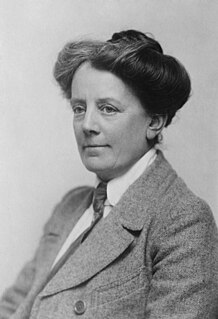
Dame Ethel Mary Smyth was an English composer and a member of the women's suffrage movement. Her compositions include songs, works for piano, chamber music, orchestral works, choral works and operas.
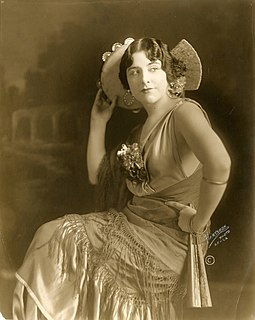
Alice Geraldine Farrar was an American soprano opera singer and actress, noted for her beauty, acting ability, and "the intimate timbre of her voice." She had a large following among young women, who were nicknamed "Gerry-flappers".
Vocal range is the range of pitches that a human voice can phonate. A common application is within the context of singing, where it is used as a defining characteristic for classifying singing voices into voice types. It is also a topic of study within linguistics, phonetics, and speech-language pathology, particularly in relation to the study of tonal languages and certain types of vocal disorders, although it has little practical application in terms of speech.

Dido and Aeneas is an opera in a prologue and three acts, written by the English Baroque composer Henry Purcell with a libretto by Nahum Tate. The dates of the composition and first performance of the opera are uncertain. It was composed no later than July 1688, and had been performed at Josias Priest's girls' school in London by the end of 1689. Some scholars argue for a date of composition as early as 1683. The story is based on Book IV of Virgil's Aeneid. It recounts the love of Dido, Queen of Carthage, for the Trojan hero Aeneas, and her despair when he abandons her. A monumental work in Baroque opera, Dido and Aeneas is remembered as one of Purcell's foremost theatrical works. It was also Purcell's only true opera, as well as his only all-sung dramatic work. One of the earliest known English operas, it owes much to John Blow's Venus and Adonis, both in structure and in overall effect.
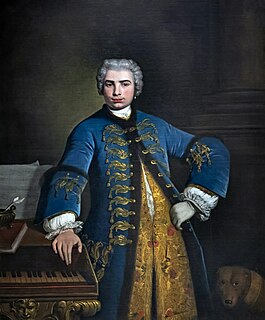
Coloratura is an elaborate melody with runs, trills, wide leaps, or similar virtuoso-like material, or a passage of such music. Operatic roles in which such music plays a prominent part, and singers of these roles, are also called coloratura. Its instrumental equivalent is ornamentation.
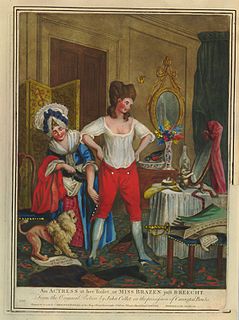
A breeches role is one in which an actress appears in male clothing. Breeches, tight-fitting knee-length pants, were the standard male garment at the time these roles were introduced. The theatrical term travesti covers both this sort of cross-dressing and also that of male actors dressing as female characters. Both are part of the long history of cross-dressing in music and opera and later in film and television.
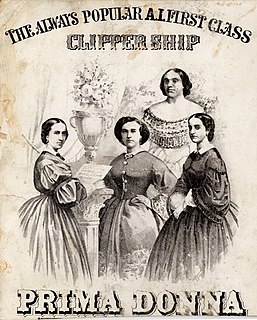
In opera or commedia dell'arte, a prima donna is the leading female singer in the company, the person to whom the prime roles would be given.
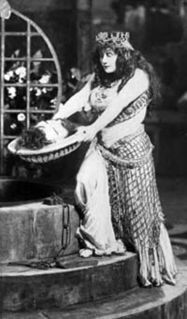
Olive Fremstad was the stage name of Anna Olivia Rundquist, a celebrated Swedish-American opera diva who sang in both the mezzo-soprano and soprano ranges.

Teresa Żylis-Gara was a Polish operatic soprano who enjoyed a major international career from the 1950s through the 1990s.
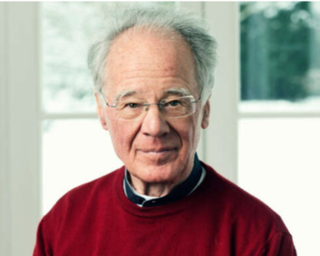
George Alexander Albrecht was a German conductor and composer, who also worked as a musicologist and academic teacher. A prolific composer at a young age, he was Generalmusikdirektor (GMD) of the Staatsoper Hannover from 1965 for 30 years, where he led not only the major operas by Mozart and stageworks by Wagner, but contemporary composers, such as Aribert Reimann's Troades in 1987. He was GMD of the Nationaltheater Weimar from 1996, and taught at the Hochschule für Musik Franz Liszt, Weimar. Albrecht promoted the works of neglected composers such as Wilhelm Furtwängler, Hans Pfitzner, and Erwin Schulhoff.
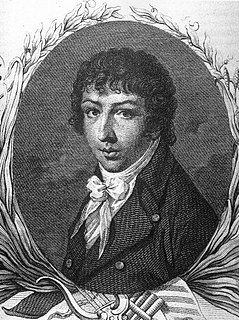
Dido, Queen of Carthage was an opera in three acts by Stephen Storace. Its English libretto by Prince Hoare was adapted from Metastasio's 1724 libretto, Didone abbandonata, which had been set by many composers. Storace's opera premiered on 23 May 1792 at The King's Theatre in London combined with a performance of his masque, Neptune's Prophecy. The story is based on that of Dido and Aeneas in the fourth book of Virgil's Aeneid. The opera was not a success and was never revived after its original run of performances. The score has been lost.
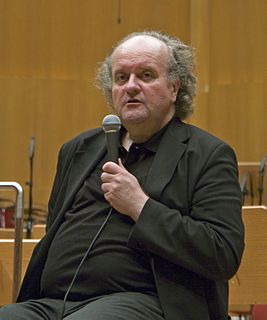
Die Hamletmaschine is an opera composed by Wolfgang Rihm to a German-language libretto based on Heiner Müller's 1977 play of the same name. The libretto, subtitled Musiktheater in 5 Teilen, was written by the composer. The opera was composed between 1983 and 1986 and premiered on 30 March 1987 at the Nationaltheater Mannheim.
Carmen Reppel is a German soprano active in both opera and concert. A member of the Staatstheater Hannover, she had a major international career, appearing in leading roles in over 60 operas. She also explored lesser-known repertoire such as Siegfried Wagner's Schwarzschwanenreich and appeared in contemporary operas, singing in world premieres of operas by Aribert Reimann and Flavio Testi. She is known for her parts in the Jahrhundertring, the centenary production of Wagner's Der Ring des Nibelungen at the Bayreuth Festival, including the filmed version of 1980.

Troades is a fabula crepidata of c. 1179 lines of verse written by Lucius Annaeus Seneca.














